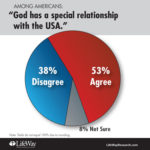WASHINGTON (RNS)—Americans are gung-ho for the idea their nation has a special status with God, and they are almost always proud of their country.
But a new survey finds flag-waving, All-American Fourth of July celebrations are tempered by concerns the nation isn’t the moral leader it once was, Christians face discrimination here at home and some folks aren’t “truly American.”
And although overall views shine bright red, white and blue, the level of enthusiasm varies according to factors such as religion, age and race, according to the Public Religion Research Institute.
 Click on the chart above to view a full-size version.A new survey finds two out of three Americans (66 percent) say God has granted America an exceptional role in human history. Not surprisingly, since the question presupposes a God, only 39 percent of people who don’t identify with any particular religion—the so-called “nones”—agree with that statement.
Click on the chart above to view a full-size version.A new survey finds two out of three Americans (66 percent) say God has granted America an exceptional role in human history. Not surprisingly, since the question presupposes a God, only 39 percent of people who don’t identify with any particular religion—the so-called “nones”—agree with that statement.
Still, “American exceptionalism is a deep and abiding belief that’s fundamental to the American DNA,” said Daniel Cox, research director for the institute.
Indeed, pride waves from this data like a flag: 63 percent overall say there never was a time they weren’t “proud to be an American.”
However, that enthusiasm doesn’t mean they’re not troubled on some points.
For example, the country is split over whether Christians (72 percent of U.S. adults) are now facing as much discrimination as other groups.
 About half of those surveyed—49 percent, strongly led by white evangelicals at 70 percent—say yes. The other half—47 percent (including 59 percent of “nones”) say no.
About half of those surveyed—49 percent, strongly led by white evangelicals at 70 percent—say yes. The other half—47 percent (including 59 percent of “nones”) say no.
Sign up for our weekly edition and get all our headlines in your inbox on Thursdays
“Christians feel like they are swimming against a cultural tide that’s rising against them,” Cox said.
He cited findings in other studies showing evangelical concerns over “everything from gay marriage to marijuana legalization, the rising numbers of ‘nones’ and the falling numbers of people who consider religion important.”
Overall, a majority (53 percent) say the country today is not setting “a good moral example for the rest of the world.”
They were not asked for examples, but Cox said each demographic, religious or political group “could point to things where they may think the U.S. has lost its way.”
While 69 percent say they see “a typical American” when they look in their mirror, this is more true for whites (77 percent) than for blacks (61 percent) or Hispanics (48 percent).
This dovetails with a very narrow vision of who is “truly American.” High on the list of very or somewhat important characteristics are people who:
• Speak English: 89 percent say this is very or somewhat important.
• Believe in God: 69 percent.
• Were born in the United States: 58 percent.
• Are Christian: 53 percent.
The survey found “profound generational differences” on the image of what constitutes a true American, Cox said.
 Click on the chart above to view a full-size version.Most seniors (66 percent) said to be “truly American” it was important to be Christian—perhaps recalling a culture that is slipping away, he said. But only 35 percent of Millennials agreed.
Click on the chart above to view a full-size version.Most seniors (66 percent) said to be “truly American” it was important to be Christian—perhaps recalling a culture that is slipping away, he said. But only 35 percent of Millennials agreed.
Among Americans who believe the United States once was a Christian nation but is not anymore, most “still wish we were,” Cox said. This shift is a bad thing, said 61 percent. Only 29 percent favor this cultural change.
Cox noted he is “continually shocked” by how divided America is by race and by how differently issues are perceived by non-Hispanic white Americans and by minorities.
The survey data—gathered before a white supremacist allegedly killed nine black people in a Charleston, S.C., church—may reflect recent months of protests over criminal justice and police killings. It was conducted June 10-14, among 1,007 adults in English and in Spanish.
The research institute found nearly two in three Americans overall (63 percent) say “protesting unfair government treatment is always a good thing for the country.”
However, a lot of support “evaporates” when examined through the prism of race, Cox said.
According to the survey, 67 percent of white Americans agree Americans protesting government mistreatment always leaves the country better off.
“But fewer than half (48 percent) of whites say the same when asked about black Americans speaking out against and protesting unfair treatment by the government,” the report says.
Among racial and ethnic minorities, including blacks and Hispanics, 56 percent agree such protests benefit the country.
Even more (65 percent) agreed that when black Americans protest unfair treatment, it makes the country better.














We seek to connect God’s story and God’s people around the world. To learn more about God’s story, click here.
Send comments and feedback to Eric Black, our editor. For comments to be published, please specify “letter to the editor.” Maximum length for publication is 300 words.